Why STD Rates Are Rising Fast, and What You Can Do to Protect Yourself
Some sexually transmitted infections (STDs), like chlamydia and gonorrhea, and early HIV can just linger in your system without triggering a single symptom for years, or even ten years. That is, you can live your life with no issue whatsoever and discover that a slow-moving infection is attacking your reproductive organ, immune system, or just overall health.
The Hidden Epidemic: What Are Asymptomatic STDs?
When we speak of being "asymptomatic," we're stating that you have an STD but are not sick, or are not even aware of any symptoms.
It's more common than most people think. According to the CDC, most cases of chlamydia and gonorrhea in America are asymptomatic because they present with absolutely no symptoms whatsoever, especially for women.
Among the most common asymptomatic STDs are:
- Chlamydia – Often asymptomatic in up to 70% of women and 50% of men.
- Gonorrhea – Can be asymptomatic in men and women, particularly in the anus or throat.
- HPV (Human Papillomavirus) – Typically asymptomatic but can cause genital warts or lead to cancer.
- HIV – Can feel flu-like in the beginning and then remain latent for years.
- Herpes (HSV-2) – Some people never develop sores or blisters but still transmit and carry the virus.
- Trichomoniasis – About 70% of people don't have symptoms.
So why is this such a big deal? Because no symptoms don't mean no harm.
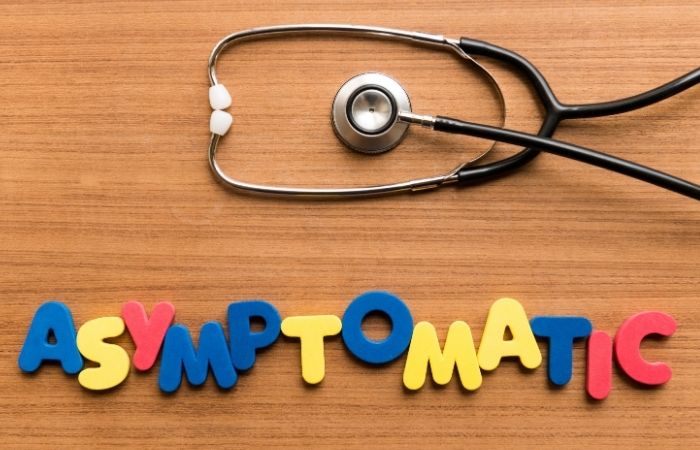
The Long-Term Damage: Why Undiagnosed STDs Are Dangerous
Reproductive Health Problems
One of the worst consequences of not treating STDs is on fertility. Chlamydia and gonorrhea, for example, can lead to pelvic inflammatory disease (PID) in women, which destroys the uterus and fallopian tubes, and thereby makes pregnancy more difficult, or even impossible.
In men, not treating STDs can lead to epididymitis, painful swelling that can also lead to infertility.
Chronic Pain and Discomfort
Some untreated STDs, although initially without symptoms, will in the future cause chronic pain. PID can cause chronic pelvic pain, and herpes can cause recurring bouts that affect quality of life.
Increased Risk of Other Infections
If you have one STD, you're more likely to have others. For example, having an untreated STD like chlamydia or syphilis can make you much more likely to acquire HIV. That's because most STDs cause inflammation or micro-tears in your genitals' tissues, and viruses such as HIV take advantage of those as openings to gain access to the body.
Complications During Pregnancy
Pregnant women with undiagnosed STDs risk passing the disease to their baby, leading to premature birth, low birth weight, or even stillbirth. Certain STDs such as syphilis also lead to congenital infections that affect the health of the baby in the long run.
Systemic Health Issues
If untreated, though, some STDs will make their way all over the body. Syphilis, for example, can infect the brain, heart, and nerves later on, developing problems well beyond sexual health.
Check Your STD Status in Minutes
Test at Home with Remedium7-in-1 STD Test Kit

 For Men & Women
For Men & Women Results in Minutes
Results in Minutes No Lab Needed
No Lab Needed Private & Discreet
Private & DiscreetOrder Now $129.00 $343.00
For all 7 tests
Why Asymptomatic STDs Don't Get Diagnosed Sooner
There are several reasons why people fail to catch asymptomatic infections early:
No standard testing: Most people assume they'll only need to come in for a test if they have symptoms, something we now realize is a dangerous assumption.
Lack of sex education: Lack of information or misinformation about STDs makes them less informed of their danger.
Limited access to care: Not all people have access to low-cost, non-judgmental testing services, especially in rural or underserved areas.
Stigma: Fear of stigma keeps a lot of people away from testing, especially those who've been with multiple people or had non-traditional sex.

Silent Doesn't Mean Harmless: What You Can Do
Get Tested Regularly
This is the single most important step in protecting yourself and others. If you’re sexually active, especially with new or multiple partners, routine STD screening should be part of your self-care routine.
Guidelines recommend:
- Once a year for sexually active individuals under 25
- Every 3–6 months for those with multiple or new partners
- Immediately after unprotected sex or suspected exposure
Consider At-Home Testing Kits
Don't prefer clinics or waiting rooms? You're not alone. Home STD test kits offer a discreet, private, and even more relaxing way to keep yourself sexually healthy. Home test kits enable you to test at home and get online results, and sometimes follow-up care is available if you do test positive.
Talk to Your Partners
We get it, talking about STDs is awkward. But transparency is key. Sharing testing history and encouraging mutual testing can actually build trust and reduce anxiety in your relationships.
Use Protection Consistently
Condoms and dental dams significantly reduce the risk of transmission for most STDs. They’re not foolproof, but they’re one of the best preventive tools available.
Get Vaccinated
There are shots for HPV and Hepatitis B, both of which are transmitted sexually. If you haven't gotten yours, it's worth asking your doctor.
Check Your STD Status in Minutes
Test at Home with Remedium8-in-1 STD Test Kit
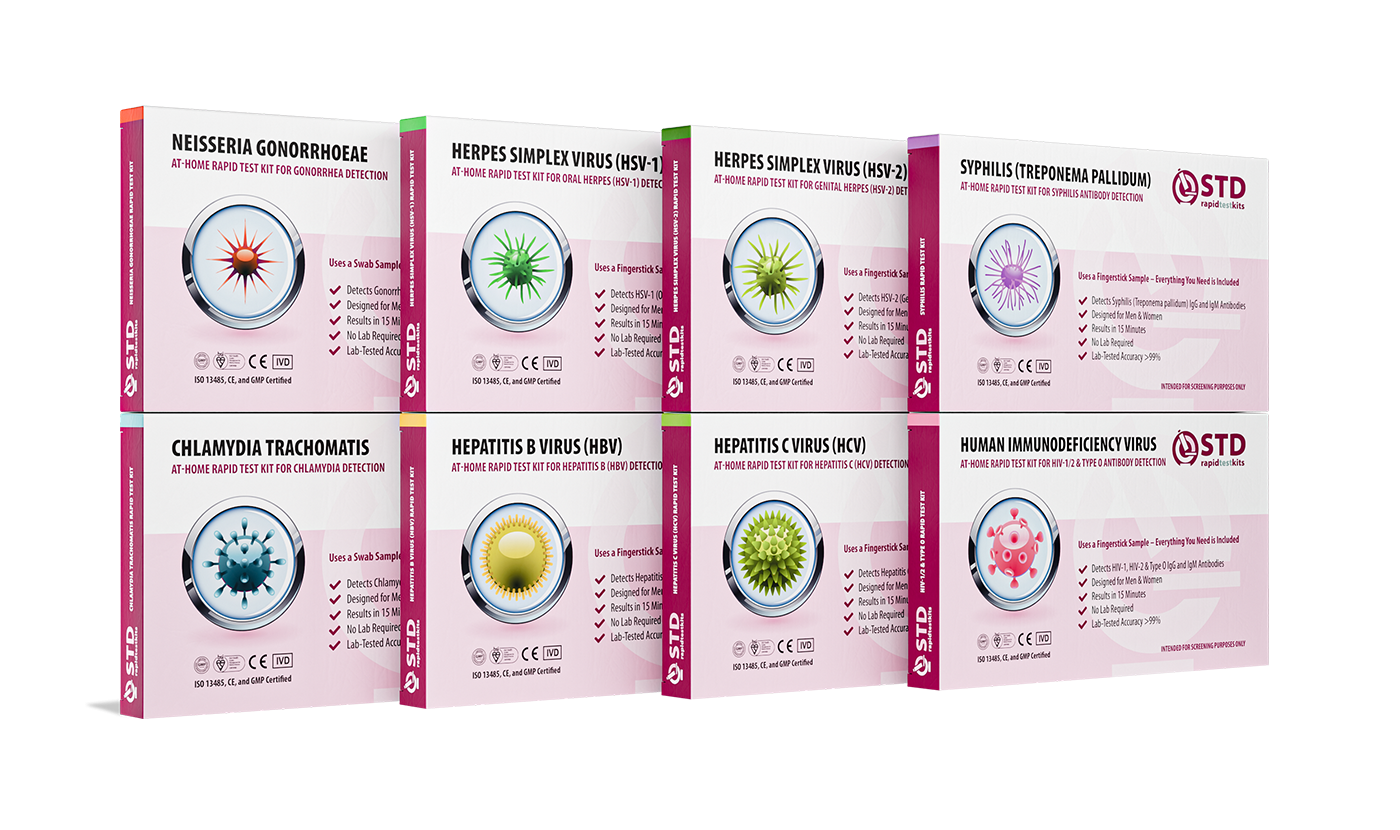
 For Men & Women
For Men & Women Results in Minutes
Results in Minutes No Lab Needed
No Lab Needed Private & Discreet
Private & DiscreetOrder Now $149.00 $392.00
For all 8 tests
What the Numbers Say: Amazing Statistics Regarding Asymptomatic STDs
Let's do the math with some shocking facts that reveal just how widespread this issue really is:
- There were more than 1.6 million reported cases of chlamydia in the U.S. in 2022, though the CDC estimates the actual number is probably twice that due to asymptomatic, undiagnosed infection.
- Over 50% of individuals with gonorrhea are unaware they have it.
- No less than 1 in 5 individuals in the U.S. has an STD at some point in time, says the CDC, most without symptoms.
- In one of The Lancet's researches, 60–70% of female trichomoniasis cases were completely asymptomatic.
- Asymptomatic infection occurs more frequently in women than in men, especially with chlamydia and gonorrhea.
When you combine silent symptoms with low testing rates, you have a perfect storm of transmission risk and long-term health effects.
What Experts Are Saying: Professional Opinions & Case Examples
Dr. Lisa Fitzpatrick, an infectious disease expert, has always emphasized that "asymptomatic STDs represent a silent public health emergency. The lack of symptoms creates a false sense of security, and that's where the true danger begins,"
Consider the case of Tasha, a 26-year-old who shared her experience on Reddit. She was in a monogamous relationship and had no reason to suspect anything until she went in for a routine Pap smear. Tests revealed that she had chronic chlamydia, and it had already caused scarring in her fallopian tubes. "I didn't even feel sick," she wrote. "But now I might not be able to have kids."
Or DeShawn, a 33-year-old man who never was tested because he believed he would "feel it" if something was wrong. Only after he was finally persuaded to get tested by a partner did he learn he had gonorrhea in his throat, completely symptomless.
These stories are not uncommon. Most people who test late regret waiting, and wish they had access to earlier, easier testing.

A Brief History of Asymptomatic Infections in STD Research
The assumption that "no symptoms = no problem" was once prevalent in medicine and society. STDs were only treated when they did develop symptoms, so many of these infections were missed.
- In the early 20th century, STDs like syphilis were diagnosed too late, leading to severe neurological complications.
- It wasn't until the 1980s and 90s that scientists realized just how many STDs, particularly chlamydia and HPV, went asymptomatic for years.
- The creation of PCR testing in the 1990s enabled infections to be detected without requiring symptoms, changing forever how we test and treat.
Even so, testing rates haven't kept up with what we currently know. Even with the science, stigma and lack of information are still enormous roadblocks.
The Future of STD Testing and Prevention
The future of STD screening and treatment is evolving rapidly.
- Home testing kits for STDs are growing in popularity with same-day results and telemedicine check-ins available.
- Some biotech companies are designing instant urine tests and phone-based devices that may provide near-instant home results.
- Public health communities, and especially college communities and at-risk groups, are debating policies on universal screening.
- The use of AI in sexual health websites is also improving risk assessment and follow-up care recommendations.
As technology and knowledge rise, so can we catch infections early, but only if people are willing to be tested in the first place.
Check Your STD Status in Minutes
Test at Home with RemediumGenital & Oral Herpes Test Kit
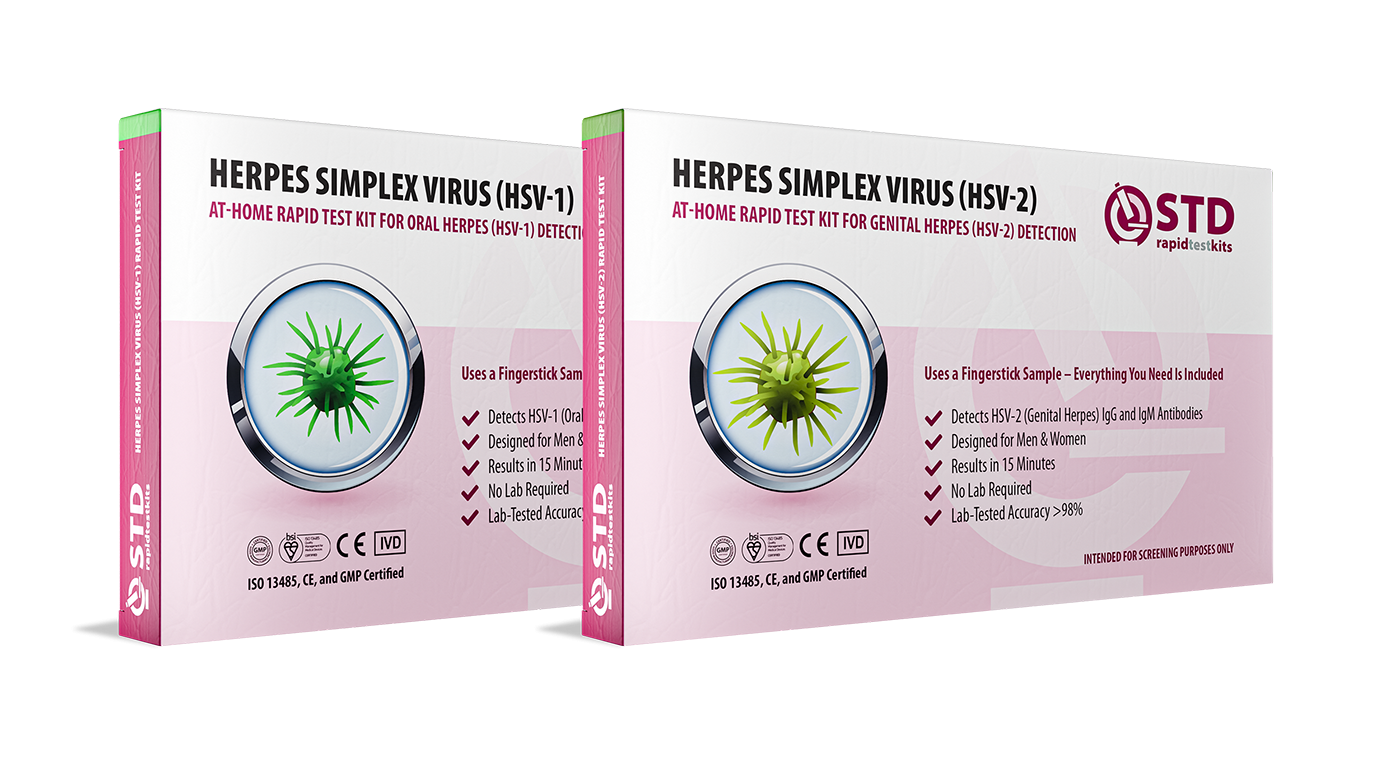
 For Men & Women
For Men & Women Results in Minutes
Results in Minutes No Lab Needed
No Lab Needed Private & Discreet
Private & DiscreetOrder Now $75.00 $98.00
For all 2 tests
Real-World Applications: What This Means for You
So what can you do with all this information?
- Include STD screening on your list of yearly wellness checkups.
- Keep home test kits in your bathroom drawer with a thermometer or pregnancy test.
- Get the people around you, your friends or your lovers, to get tested, not because you suspect anything, but because you care.
- Talk to your health care provider even if you're feeling fine. A simple question like, "Should I get tested?" will take you far.
This isn't a science story, it's about you. Silent STDs don't care how good you feel or how safe you've been. Getting tested ahead of time is one of the strongest things you can do for yourself and your partners.
How the Industry is Addressing Asymptomatic STDs
The health and healthcare industries are slowly waking up to the scope of this problem:
- Insurance carriers are now covering regular STD testing, especially for young adults.
- Planned Parenthood and in-city clinics are now offering self-collected samples, so patients can test less openly.
- Universities and youth organizations are launching campaigns targeting the myth that "no symptoms" equals "no problem."
- Drugstore chains now carry chlamydia, gonorrhea, and other disease test kits, bringing access along with toothpaste and vitamins.
Even with advances, additional awareness is required to promote accessible, stigma-free testing for everyone.
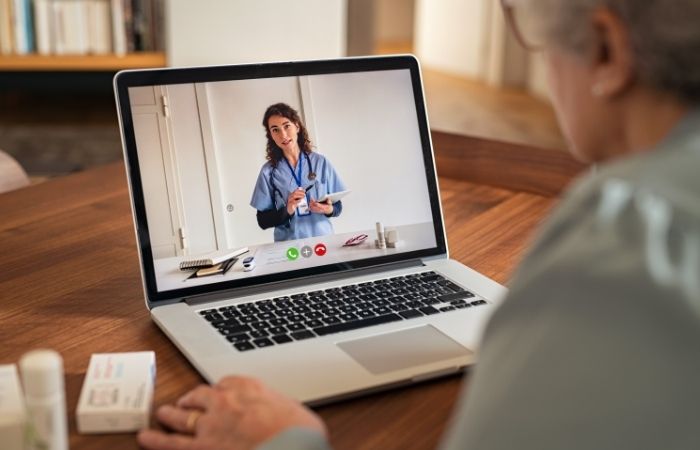
Personal Stories: When Silence Isn't Golden
Let's be human for a minute.
Lena, 21, found out she had HPV as part of a routine exam.
"I didn't have one symptom. Nothing. But I'm glad I got that Pap test, it probably saved my life."
Marcus, 28, was HIV positive after attributing his exhaustion to stress for months.
"I had no idea. I didn't feel sick. I felt normal. I almost didn't go in for the test."
Jamie, 35, discovered they had trichomoniasis while preparing for pregnancy.
"I'd had it for who knows how long. And I still don't know who gave it to me."
These aren't horror tales, these are fact. And they show how easily even smart, responsible people miss the signs when there are no signs to find.
Misunderstandings Surrounding Asymptomatic STDs
Here are a few myths that scare people away from being tested:
"If I had an STD, I'd know."
Actually, most STDs never show symptoms, or only momentarily and mildly.
"I only slept with one guy without a condom, so I'm okay."
It takes only one encounter to contract an STD, and they may not show up for weeks, or ever.
"My partner would inform me if they were infected."
They may not even be aware that they're infected themselves.
"STD testing is embarrassing."
It's more common, and more discreet, than ever before, especially with home tests.
"I don't need to test if I'm healthy."
Healthy doesn't necessarily mean you're infection-free.
Check Your STD Status in Minutes
Test at Home with Remedium3-in-1 STD Test Kit
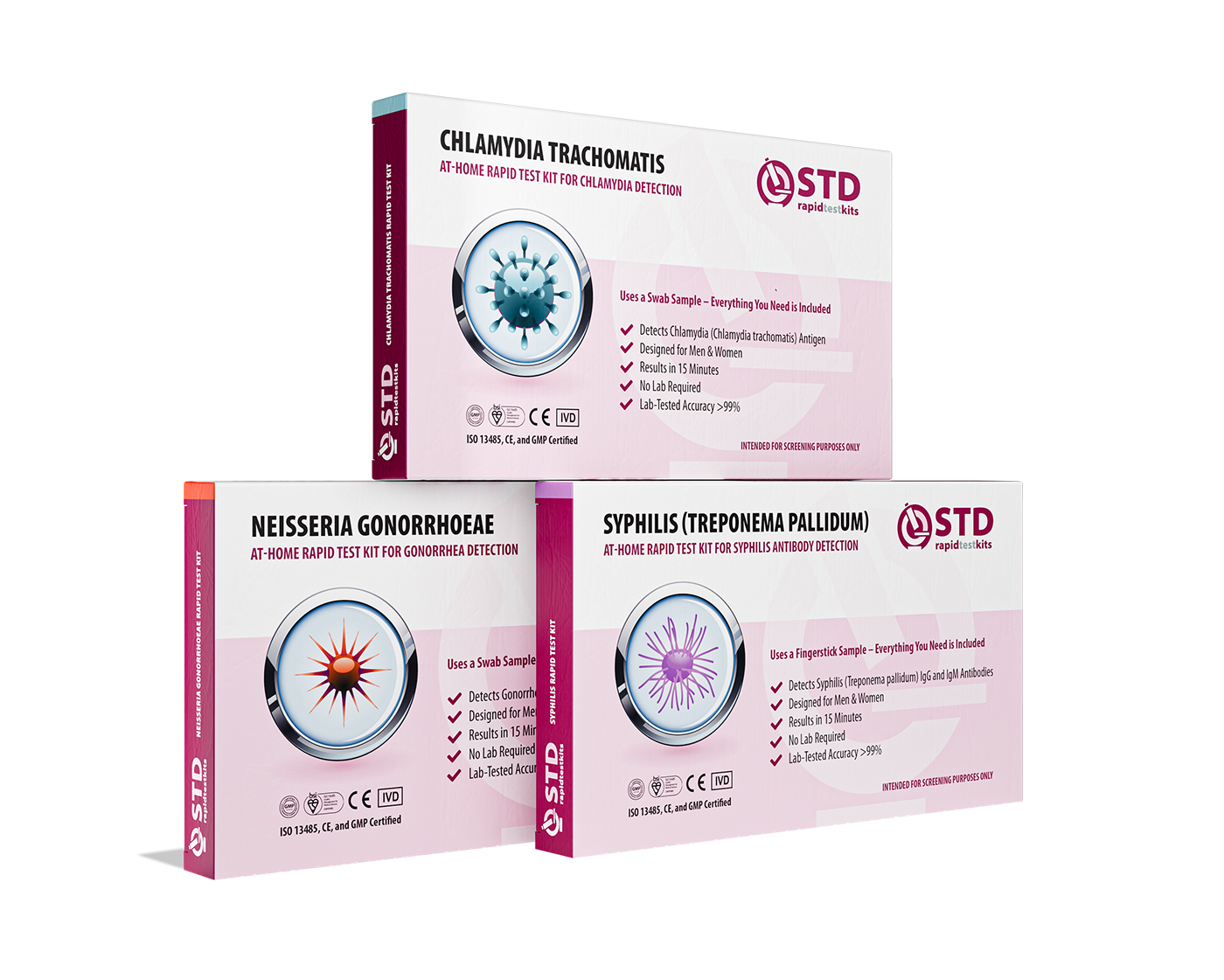
 For Men & Women
For Men & Women Results in Minutes
Results in Minutes No Lab Needed
No Lab Needed Private & Discreet
Private & DiscreetOrder Now $69.00 $147.00
For all 3 tests
FAQs
1. Can you have an STD and not feel at all fine?
Yes. Most STDs are symptomless for months or years.
2. How often should I be tested if I'm sexually active?
At least once a year, more frequently if you have new or multiple partners.
3. Are in-home STD tests accurate?
Most are very reliable if used properly and follow-up is accessible.
4. Can you spread an STD if you're not symptomatic?
Yes. Asymptomatic individuals can pass on STDs.
5. Which STDs are most likely to be asymptomatic?
Chlamydia, gonorrhea, HPV, and HIV are common asymptomatic infections.
6. Can untreated STDs cause infertility?
Yes. Untreated STDs like chlamydia and gonorrhea can lead to irreversible reproductive damage.
7. Do condoms protect completely against asymptomatic STDs?
They reduce risk significantly, though no STDs are prevented 100%.
8. Can you have more than one STD at once?
Yes, co-infections are more common than you might think, especially among people with high-risk behaviors.
9. How do I talk to a partner about getting tested?
Be honest and casual, put it in loving terms, not accusing ones.
10. What if I test positive from a home test?
Tell the partner about the results. The majority of the kits also have follow-up care, and you can simply go to your doctor or clinic to get treated.
Take Control: Don't Wait Until Symptoms Appear
Come on: life is nutty. You've got a job, you've got people, you've got a thousand things you have to do. But your health can never go on the backburner, particularly when something as lethal as an STD could be lurking in front of your face.
The truth is, you may not always be aware you're sick when something is wrong. And with STDs, waiting around for symptoms is a gamble you don't want to play.
Get tested. Forward this article to someone you care about. And if you're not willing to go to a clinic, try at-home STD test kits for extra convenience and reassurance.
Because keeping quiet shouldn't mean staying at risk.










